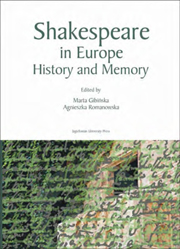Book contents
- Frontmatter
- Contents
- Preface
- Towards a European History of Henry V
- History and Histories
- History and Memory: Criticism and Reception
- History, Memory, and Ideological Appropriation
- Claiming Shakespeare as “Our Own”
- “Must i Remember?:” Hamlet, Memory and Shakespearean Trauma
- Interdisciplinary Shakespeare in the Socialist Republic of Romania. A Comment on Official Censorship and Subversive Practices
- Mingling and Separating in Coriolanus
- “A Goodly House:” Memory and Hosting in Coriolanus
- “Suit the Word to the Action:” Shakespeare's Richard II (2004). A Case of (Meta)Translation?
- “Speak, Memory:” Anniversary Celebrations in the History of the German Shakespeare Society
- Theatre: The Act of Memory and History in the Making
- Index of Authors
“Suit the Word to the Action:” Shakespeare's Richard II (2004). A Case of (Meta)Translation?
from History, Memory, and Ideological Appropriation
Published online by Cambridge University Press: 05 September 2014
- Frontmatter
- Contents
- Preface
- Towards a European History of Henry V
- History and Histories
- History and Memory: Criticism and Reception
- History, Memory, and Ideological Appropriation
- Claiming Shakespeare as “Our Own”
- “Must i Remember?:” Hamlet, Memory and Shakespearean Trauma
- Interdisciplinary Shakespeare in the Socialist Republic of Romania. A Comment on Official Censorship and Subversive Practices
- Mingling and Separating in Coriolanus
- “A Goodly House:” Memory and Hosting in Coriolanus
- “Suit the Word to the Action:” Shakespeare's Richard II (2004). A Case of (Meta)Translation?
- “Speak, Memory:” Anniversary Celebrations in the History of the German Shakespeare Society
- Theatre: The Act of Memory and History in the Making
- Index of Authors
Summary
Before we enter the world of Richard II, let us begin with the tricks of the trade and rehearse the most celebrated of all Shakespeare's rehearsals. “Suite the action to the word, the word to the action” – Hamlet's illustrious antimetabole decks one of the play's rare moments of sincerity which the Prince shares with a bunch of vagabonds and, perhaps, we with Shakespeare. The locus classicus of Elizabethan metatheatricality hints briefly at the practicalities of contemporary stage acting, and soon unfolds into the patently intertextual dictum on the universal purpose of playing. Given the apparent emphasis on the quality and interpretation of performance, one is likely to pass over the wittingly non-reciprocal nature of Hamlet's tutoring. Thus, the action suited to the word refers primarily to the actor's expressiveness, whereas the other action denotes also broadly understood circumstances, ranging from the pre-existent plot to the immediate context of performance which is here constituted by the quandary of Claudius's unproven guilt. In other words, Hamlet not only instructs the players how to make the best of their lines within the fictional framework of The Murder of Gonzago, but also how to use these lines to accommodate his “action” and fasten the grip on the king's conscience. The latter aspect can be best understood the day before, when Hamlet meets the First Player: “You could, for a need, study a speech of some dozen or sixteen lines which I would set down and insert in't, could you not?,” inquires the Prince. Understandably enough, the answer is “Ay, my lord” (II.2.528–30).
- Type
- Chapter
- Information
- Shakespeare in EuropeHistory and Memory, pp. 239 - 252Publisher: Jagiellonian University PressPrint publication year: 2008

